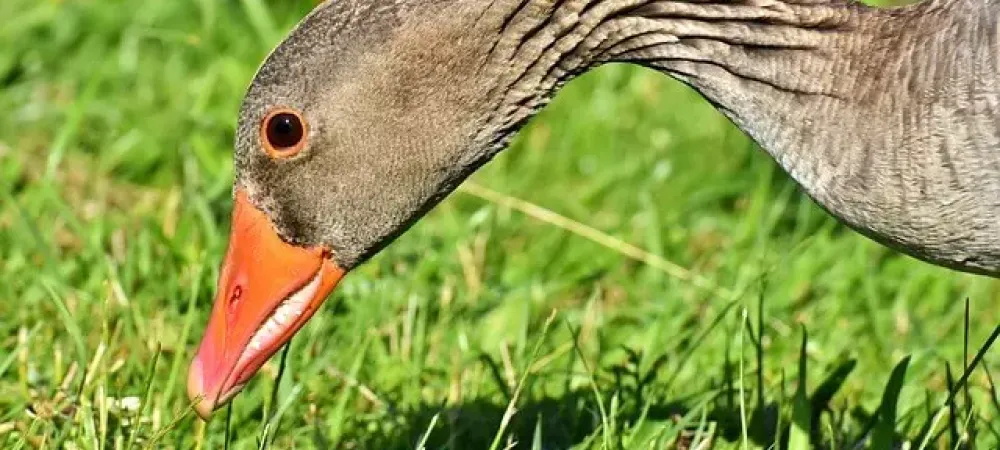How to Keep Geese from Ruining Your Yard

If you live in Virginia, you know that geese can be a huge nuisance. Not only do they make a mess of your yard, but they can also pose safety concerns and damage your property. In this blog post, we will discuss some tips on how to keep geese from ruining your yard in a humane and effective manner.
Understanding Geese Behavior
Where Do Geese Come From?
Geese are migratory birds, and they often travel long distances to find suitable habitats. During the summer months, you can typically find them near bodies of water like lakes, rivers, and ponds. These locations provide abundant food and safe nesting sites. However, as colder weather sets in, geese seek new areas with accessible food and open water, making suburban and urban areas in Virginia attractive to them.
Virginia’s mild winters and abundant water sources make it an ideal stopping point for migratory geese. Over time, some geese have stopped migrating altogether, choosing to reside year-round in these hospitable environments. These resident geese are often the ones causing issues for homeowners.
Do Geese Lay Eggs?
Yes, geese lay eggs, and they are prolific breeders. A single female goose can lay up to 12 eggs per clutch. The nesting season for geese in Virginia typically spans from March to July. During this time, geese become particularly territorial and aggressive as they defend their nests. Eggs usually hatch within 28 days, and the goslings remain under their parents’ care for several weeks, further prolonging the geese's presence in your yard.
Are Geese Dangerous?
Geese can indeed pose dangers, especially if they feel threatened. During the nesting season, they are known to become highly aggressive, hissing, flapping their wings, and even charging at people or pets who come too close to their nests. Injuries can occur from falls or bites during such encounters. Additionally, geese can damage lawns, gardens, and outdoor spaces with their grazing and droppings, which can also pose health risks due to bacteria and parasites.
Humane Ways to Keep Geese Away
If geese have made themselves at home in your yard, there are humane strategies you can employ to discourage them from staying. Here are some effective tips:
1. Install Physical Barriers
Geese are deterred by obstacles that make it difficult for them to access their preferred areas. Consider installing fences or planting dense shrubs along the perimeter of your yard, especially near water features. A low fence, about 18-24 inches high, can prevent geese from waddling into your property.
2. Modify the Landscape
Geese prefer open, grassy areas where they can easily spot predators. You can make your yard less appealing by planting taller vegetation, such as ornamental grasses or shrubs, around ponds or open spaces. Allowing grass to grow longer in some areas can also discourage geese from settling.
3. Use Goose Repellents
There are several humane repellents available that can help keep geese away from your yard:
- Gel Repellents: Applied to grassy areas, these create a sticky surface that geese dislike walking on.
- Visual Repellents: Items like reflective tape, decoy predators (e.g., fake owls or coyotes), or brightly colored balloons can scare geese away.
- Taste Repellents: Spraying a non-toxic, goose-specific repellent on your lawn can make the grass unpalatable to them.
4. Employ Noise Deterrents
Geese are startled by sudden loud noises. Using air horns, whistles, or other noisemakers can encourage them to leave the area. However, it’s important to vary the timing and location of the noise to prevent geese from becoming accustomed to it.
5. Introduce a Dog
Dogs are natural goose deterrents. A trained dog can patrol your yard and chase away geese without harming them. Many professional goose management companies use border collies specifically trained for this purpose.
6. Manage Water Features
If you have a pond or other water feature, consider making it less hospitable to geese. Installing motion-activated sprinklers can startle geese when they approach. You can also add floating devices or netting to discourage them from swimming and nesting.
Preventative Measures
Taking proactive steps to deter geese before they settle is often the most effective strategy. Regularly inspect your yard for signs of geese activity, such as droppings or flattened grass, especially during the early spring months. Removing these signs quickly can discourage geese from viewing your yard as a suitable habitat.
If you have a pond or water feature, maintain its edges by keeping vegetation trimmed or installing barriers. This will make it less attractive to geese looking for nesting sites. Additionally, educate your family and neighbors about the importance of not feeding geese. Feeding only encourages them to stay and increases their dependence on human-provided food sources.
Call the Professionals at Agronomic Lawn Management
If geese continue to be a persistent problem despite your efforts, consider contacting our goose control experts. Our experts can assess your property and implement customized solutions to control the geese population humanely.
By understanding their behavior and implementing humane deterrent strategies, you can protect your property and maintain a peaceful outdoor environment. From installing barriers to using repellents and noise deterrents, there are many ways to keep geese at bay without causing them harm.
